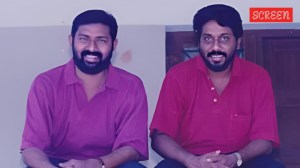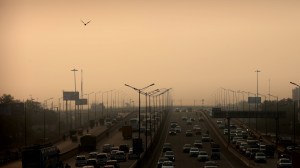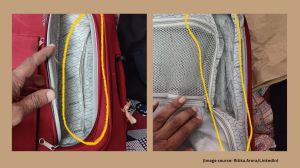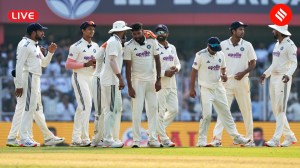Smart Cities, smart ideas: Public transport backbone, power to municipalities and unlocking land value
The panel was unanimous on the view that it is the development of brownfield cities that pose a challenge and need to be executed efficiently.
 Urban Development Minister M Venkaiah Naidu in conversation with Anant Goenka, Wholetime Director & Head — New Media, The Express Group, at the Digital India Dialogue in New Delhi on Tuesday. During the conversation, Naidu said, “By October 2015, we want to see that the new smart cities are launched in various states.”
Urban Development Minister M Venkaiah Naidu in conversation with Anant Goenka, Wholetime Director & Head — New Media, The Express Group, at the Digital India Dialogue in New Delhi on Tuesday. During the conversation, Naidu said, “By October 2015, we want to see that the new smart cities are launched in various states.”
Terming the development of 500 brownfield smart cities similar to ‘entrepreneurship’, Bibek Debroy, economist and a fulltime member of the NITI Aayog, said that even if India succeeds in developing 10 per cent of them or 50 cities properly and they take-off, it will lead to big economic and social benefits.
Speaking in a panel discussion at the ‘Digital India Dialogue’, an initiative of The Express Group in a venture with NewsX and presented by ESDS, Debroy credited the government for recognising the importance of urbanisation. “Urbanisation is correlated with economic development and … this particular government has actually recognised it,” said Debroy.
The panelists in the discussion moderated by Subhomoy Bhattacharjee, deputy editor, The Indian Express, included Amitabh Kant, secretary, department of industrial policy & promotion; Onno Ruhl, country director for India, World Bank and Piyush Somani, MD, ESDS Software Solution.
[related-post]
The panel was unanimous on the view that it is the development of brownfield cities that pose a challenge and need to be executed efficiently and effectively for India to be able to derive benefits of urbanisation.
“Dholera will become a smart city but if one has to look at the other 500 cities, they will not become smart in that greenfield sense, they will become smart only in a piecemeal sense,” said Debroy.
He also raised the issue of governance within the census towns that have graduated out of the village status in the period between 2001 and 2011 but have not yet become a town or city. “It is very difficult to figure out what is a unit of governance that transmits any particular government scheme or programme,” said Debroy.
Echoing a similar opinion, Ruhl said, “The opportunity is to empower local governments in census towns going forward. The delta is how you empower local governments in intermediate cities that help you manage the PPPs at a local level.”
While he pointed out that India has been a late starter towards urbanisation, Ruhl drew comparison between Mumbai and Lagos in Nigeria and said that while the latter has managed to create an artificial island in front of Lagos despite huge problems, Mumbai, too, can do that. He, however, called for developing greenfield cities that are sustainable.
Admitting that India has started late on urbanisation, Kant said that there are advantages of starting late. “We can learn from many experiences across the world and use technology to leapfrog,” said Kant. He, however, added that public transportation, recylcing water and treating solid waste is critical for a smart city.
“When we started planning then other than land the key challenge in India was … to plan for compact, dense cities on the back of public transportation. However the biggest challenge for urbanisation is your ability to monetise the land value,” said Kant. He also called for municipal powers to be vested in the SPVs. “States will pass on the powers to levy all the fee back to SPVs. It was a huge challenge and we have won the battle in Gujarat, Maharashtra and MP,” said Kant, adding that they have pacts with shareholders and states.
Meanwhile, Somani raised concerns on the policy front and asked why a software firm would invest. “My concern is on policy front. You need to have policies for data that will be generated out of these smart cities and how will they be analysed,” said Somani.
Question hour with Naidu
What are you going to do to empower local governance?
Arun Maira (Former member, Planning Commission)
M Venkaiah Naidu: The PM believes in decentralisation and federalism. Accepting the 14th Finance Commission around 49.5 per cent of the Central revenue is going to go to the states and 5 per cent of the Central money will directly reach the urban local body so that they get some financial strength. We are also continuously persuading the states to give the 3Fs to the local bodies — funds, functions and functionaries. Unless you transfer them, the urban local bodies will not be effective. We are also persuading states to go for fixed tenure of 5 years for mayors.
What role can research institutions play in building knowledge and capacity?
Rajat Kathuria (Director and chief executive, ICRIER)
M Venkaiah Naidu: We are issuing guidelines to utilise the IITs. We are also asking institutes for urban and rural India and others to actively engage and come out with ideas. For e.g. rain water harvesting in mandatory in Chennai. Similarly we are going to change 5 lakh street lights in Delhi to LED lights without any burden on people. Such new ideas have to come and that is possible by evolving the research institutes.
You mentioned about the role of ICT in making the cities smart. There are many things like creation of ICT platform, for example, setting up high-speed optical fibre in the cities which do not require the Centre to invest much but only needs enablement.
R Chandrashekhar (President, NASSCOM)
M Venkaiah Naidu: ICT is important to the city channel system. For example, different departments come and dig the roads at different times and so having the duct system will help and the infrastructure will not get affected. We will be happy to work with NASSCOM and take their ideas. We are in the process of learning.





- 01
- 02
- 03
- 04
- 05


























